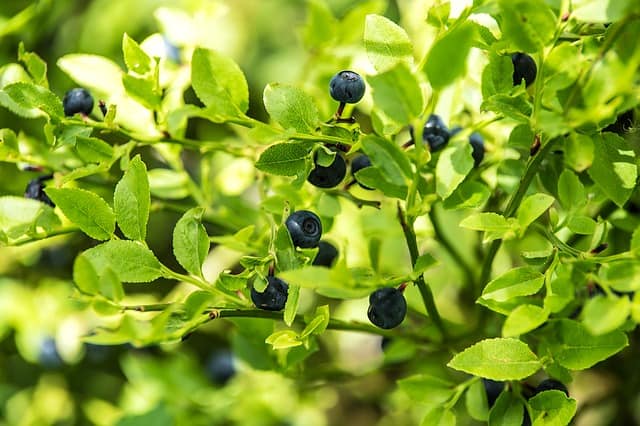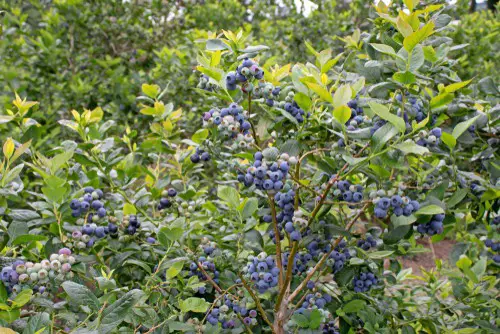Blueberry bushes are considered to be one of the easiest fruits to grow, which is a very good thing considering the fact that most gardeners have a lot of trouble growing just about any kind of fruit. However. do blueberry bushes lose their leaves?
If you decide to add blueberry bushes to your garden, you won’t be disappointed.
Blueberries are a superfood. As a plant that grows well on its own, you will have to opportunity to harvest some of the healthiest fruit and antioxidants available. With all of that being said, it’s extremely disconcerting to see a blueberry bush reach its prime, only for all of the leaves to start falling off.
While blueberry bushes may look and taste great, it is important to know that they can lose their leaves due to a number of factors, including insect pests, diseases, and even too much water or not enough sunlight.
Do Blueberry Bushes Lose Their Leaves?

A blueberry bush is a deciduous plant, which means it will lose its leaves in the fall, heading into winter. If you see your blueberry bush losing all of its leaves in October and November, it’s nothing to worry about. Losing its leaves any earlier is cause for concern.
A blueberry bush that is shedding all of its leaves in the summertime and in the early fall indicates there is a serious problem going on. For the most part, it means that there is something vital missing in the blueberry bush’s diet.
It’s the result of under or overwatering, a lack of nutrients in the soil, or the weather is a problem. But how do you know what is going on? Blueberry bushes are not very small and if they grow to proportion before suddenly shedding all of their leaves, it can come as a surprise.
No matter when a blueberry bush sheds its leaves, it’s going into a dormant state. For the winter months, this is completely normal and shouldn’t be a cause for concern or worry. In the summertime, it means that it’s going dormant and may never recover, dying somewhere along the way.
1. Under and Overwatering

One of the primary culprits, especially for newbie gardeners, is too much water or simply not enough water. It’s easy to see when a blueberry bush is underwatered because its leaves will dry up, often curling before they fall off. You can easily rectify that by paying close attention to what state the blueberry bush is in.
An underwatered blueberry bush is not something that you can miss. The plant will visibly sag, with curling, unhealthy-looking leaves. Too much water, on the other hand, will turn the leaves yellow and you will also notice that green leaves will fall off along with the yellow ones.
2. Lack of Nutrients

Fertilizers are not the way to go with blueberry bushes. They are often too harsh or not harsh enough on the surrounding soil. You want to use regular compost and make sure you have manure in the compost.
Blueberry bushes absolutely love the stuff and will thrive on it if you correctly mix it into the surrounding soil. You can also use coffee grounds that have gone through the coffee pot and you would otherwise have thrown away. Coffee ground, mixed with pulverized eggshells are an excellent combination as well.
You should also have a soil tester handy with the goal of getting the pH of the surrounding soil to somewhere between 4.5 and 5.5—no higher than 6.0. While a soil tester is an excellent device to keep handy around the house, simple pH soil test strips work nicely as well.
3. Weather Problems

Zones 4 through 7 are considered to be the best zones for growing blueberry bushes because they have the most hospitable climates. Of course, there is more than one kind of blueberry bush as well. If you live in zones 8 and 9, a Rabbiteye Blueberry Bush is the only kind you will successfully grow.
Lowbush Blueberries can tolerate the climate in zone 3. Blueberries will simply shed all of their leaves if they are either too hot or too cold and you won’t get anything from them. In extremely cold climates, you have to actively protect blueberry bushes while they are dormant.
Provide them with a thick layer of mulch, which will help protect their roots from the freezing temperatures, especially if the cold weather goes on long enough to penetrate deep into the ground.
Also read: Calathea Not Closing at Night
Final Thoughts
Blueberry bushes do lose their leaves throughout the fall and winter seasons, so there is nothing to be concerned about there. Losing its leaves in the summer or even in the spring is cause for alarm.
Fortunately, losing its leaves at the wrong time of the year is not a sign that the blueberry bush is done for, and taking corrective actions will set it right again.
Frequently Asked Questions
Where is the best place to plant blueberry bushes?
Blueberry bushes thrive in well-aerated soil and with plenty of sunshine throughout the day. You want the blueberry bush to be in an area where you can easily access it so you can provide it with adequate water, sustenance when necessary, and mulch in the winter.
How fast does a blueberry bush grow?
If you were to plant it from a seedling, you will have to wait between 6 and 8 years to start harvesting blueberries from the bush. At its full maturity, a blueberry bush will grow to between 6 and 8 feet tall.
Do blueberry bushes spread?
It’s called suckering and it’s how blueberry bushes spread. If you plant a single bush, as the years go by, it will spread on its own through this process.
How long do blueberry bushes last?
So long as you are active with your blueberry bush, in terms of adequate care and cultivation, your blueberry bush is likely to outlast you, surviving for around 50 years and perhaps longer. Even a short-lived blueberry bush should at least provide you with a solid 30+ years of production.
What is the best time to plant a blueberry bush?
The best time to plant a blueberry bush is during the fall and early in the spring. While you can plant it at just about any time during the fall season, you don’t want to plant your blueberry bush too late in the spring.

Hey, I’m Lisa and I’ve been an avid gardener for over 30 years. I love writing, talking and living in the garden! Feel free to connect with me on my socials below

